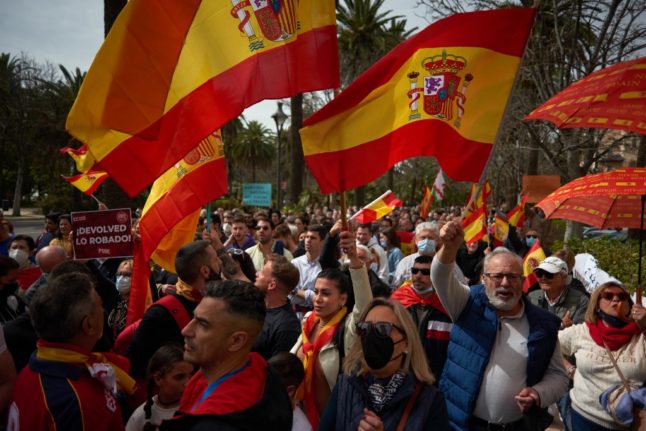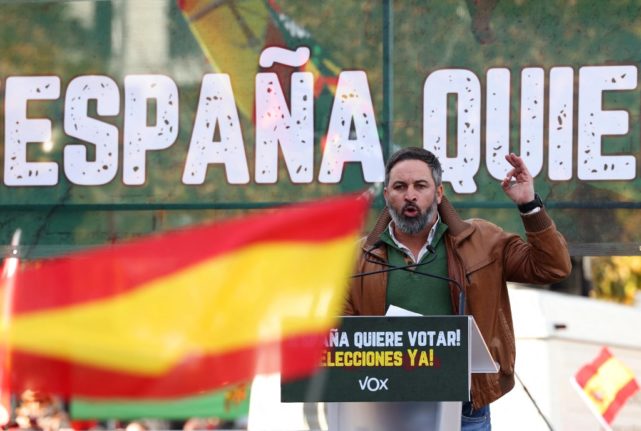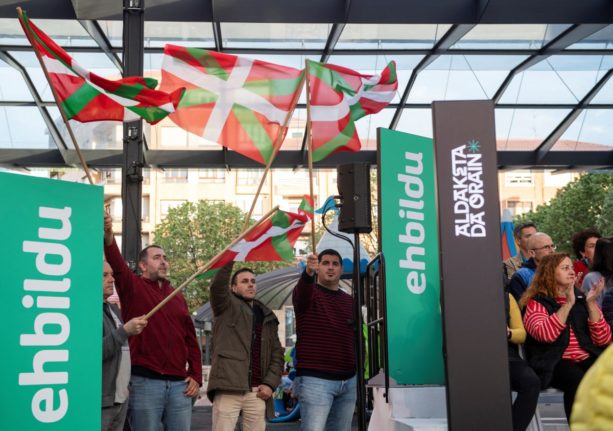With just over a month for Spain’s snap elections to take place, several polls have concluded that Spain’s longstanding right-wing Partido Popular will need far-right Vox to achieve an absolute majority with which to oust Pedro Sánchez and govern in Spain.
PP head and likely new Prime Minister Alberto Nuñez Feijóo has so far distanced himself from the prospect of reaching a deal with Vox leader Santiago Abascal, but the evidence from local and regional elections in late May suggests that partnering up with the ultra-nationalist party is indeed on the table.
PP-Vox coalitions have been agreed in 10 major Spanish cities including Toledo and Burgos, as well as in the coastal Valencia region.
Vox is now Spain’s third main political party and its popularity has been on the up since it first entered regional government in Spain in 2022 in the country’s Castilla y León region.
Vox’s stance is populist, ultraconservative, ultranationalist, and crucially for many of readers, openly anti-immigration.
Their position as potential junior coalition partner may not mean they get to implement all the legislation they’ve campaigned for over the past decade, but as seen with far-left Unidas Podemos’s Only Yes means Yes and transgender laws, being in government allows for greater political influence.
We’ve reviewed Vox’s policy ideas on immigration to try and get a better idea of what a PP-Vox government might look like, and how it could affect foreigners.
Illegal deportation of all illegal immigrants
According to Vox’s own policy agenda on its official website, the number one priority in its immigration agenda is the deportation of all illegal immigrants.
While experience would suggest that Vox has a particular sociological and racial profile in mind for the type of immigrant lined up for deportation, one has to wonder if it would also include Brits staying illegally on the costas post-Brexit.
Perhaps leader Santiago Abascal’s comments in the Spanish Parliament in 2022 on how “anyone can tell the difference” between Ukrainians arriving in Spain following Russia’s invasion and, in his words, “young military-aged men of Muslim origin who have launched themselves against European borders in an attempt to destabilise and colonise it.”
Deportation of legal migrants with criminal records
Similarly, Vox proposes the deportation of legal migrants who have committed crimes in Spain and regularly cites statistics about the proportion of crimes committed by immigrants, although there is no data available on the breakdown between legal and illegal immigrants with regards to crime.
Militarised borders
Vox leader Santiago Abascal can always be relied on to hit on a handful of key talking points wherever he goes, whatever he’s talking about, and whatever the topic. One of those is the migrant situation in Spain’s north African territories, Ceuta and Melilla. In one of Abascal’s many pieces of populist rhetoric alluding to former President Trump, Vox has said it would militarise Spanish borders in north Africa. Build a wall? Maybe.
In reality Spain’s borders are already heavily militarised with the help of EU funding, and under the Sanchez PSOE government Spain is already facing challenges in human rights courts, but this process would be turbo-charged if Vox ever got anywhere near La Moncloa.
Blatant anti-immigrant propaganda
Vox have regularly used unashamedly (and often false) anti-immigrant propaganda during election campaigns. In Madrid a poster depicting a young, dark-skinned, hooded male was put up in metro stations, claiming that an immigrant minor would cost taxpayers a large sum of money each month, and comparing that with a grandmother who would only receive a measly pension.
Expect the blatant anti-immigrant propaganda to continue if Vox gets a seat in government at the national level.
Toughen citizenship laws
Vox would also push to increase the required period of residency to gain citizenship from ten to fifteen years, banning nationality applications from those with criminal records either in Spain or their country of origin and requiring people to give up their other nationalities.
Overall, Vox’s aim is to ensure the ius sanguinis (“right of blood”) is always greater than the ius solis (“right of land”), so that lineage prevails over the place of birth when obtaining nationality. This has widely been understood as a discriminatory measure against north African migrants, but does come as part of broader efforts to prioritise Latin Americans with Spanish heritage.
READ MORE: Far-right Vox aims to toughen Spanish citizenship laws

Prioritising Spaniards for benefits
In a classic piece of nativist rhetoric, Vox would prioritise Spaniards and “national priority” when accessing social housing, rental subsidies and various other types of social welfare. Despite being largely economically liberal, and against state intervention and welfarism, Abascal made his “national priority” policy speech – in Ceuta, of course – clear that any welfare that does exist will be given to Spaniards first, and foreigners (legal or illegal) second.
Getting rid of the ‘arraigo’ process
There exists a process in Spain that allows for some undocumented immigrants to claim residency after living in Spain for a certain period if they can prove familial or employment links to Spain, demonstrate extraordinary circumstances, or, after three years, prove they have lived in Spain continuously. The arraigo is for non-EU citizens wishing to formalise their status in Spain. In it’s 2018 electoral programme, Vox included among its policies scrapping the arraigo option for undocumented migrants as well as other fast-track options for obtaining nationality.
Make language and culture exam harder
Vox has also promised to raise the required standard to pass the Spanish language and cultural and history exams in the process of getting nationality.
Gibraltar
With uncertainty looming over the rock in the drawn out Brexit deal negotiations, a Vox government would undoubtedly spark nationalist rhetoric and increase tensions on the border. Vox have regularly held rallies directly across the border in La Línea de la Concepción, even planted a Spanish flag there, and regularly spout nationalist rhetoric about Gibraltarians being pirates and parasites, and that the Rock is Spanish in order to rile up blood and soil nationalist sentiment.
A key point for Britons in both Spain and Gibraltar – if a Brexit deal regarding Gibraltar isn’t made before the next general election and Vox play a minority role in a national government, which is an unlikely but plausible outcome, it is likely negotiations will be have to be completely restarted and any progress made torn up.





 Please whitelist us to continue reading.
Please whitelist us to continue reading.
Member comments